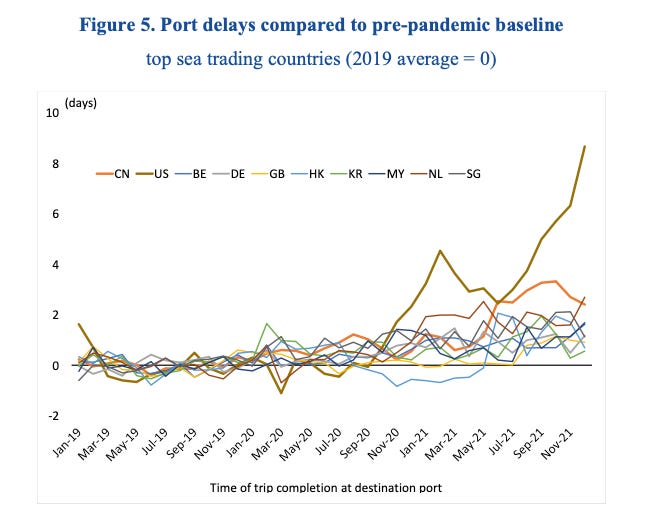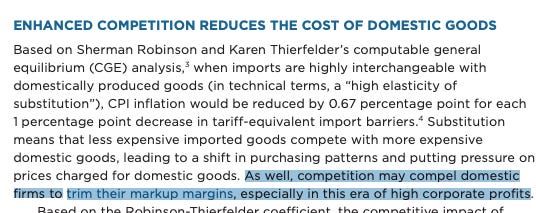Did the Ocean Shipping Cartel Impose a 20% Tariff on U.S. Imports?
The ocean shipping cartel have de facto erected a tariff on U.S. imports of up to 20%. And that's not even getting into the straight-up export ban.
Welcome to BIG, a newsletter on the politics of monopoly power. If you’d like to sign up to receive issues over email, you can do so here.
I love old movies, especially when you notice something about them that is oddly modern yet old-fashioned. I also enjoy reading old articles about economics, for the same reason. Back in 2012, two economists, David Hummels and Georg Schaur, wrote an article titled “Time as a Trade Barrier”, about how shipping delays are equivalent to tariffs. Stuff that makes it slower to import things is just like charging an import tax. “We estimate,” they wrote, “that each day in transit is equivalent to an ad-valorem tariff of 0.6 to 2.3,” especially for time-sensitive trade in parts and components. Speeding up shipping is equivalent to cutting tariffs, and slowing it down is a trade barrier. They pointed out that sharp reductions in the price of air shipping had dramatically increased the role of China in manufacturing, and the broad “fragmentation” of supply chains across the world.
That’s a super useful and modern perspective, from an old paper. But it was still old-fashioned, in a sense. In 2012, pushing thin globalized supply chains through trade agreements was still cool, so these economists thought they were making a smart point that there were further tariff cuts to make, in the form of getting rid of security and customs arrangements. The world, of course, has changed. Last week, three International Monetary Fund economists picked up on the work of Hummels and Schaur to calculate the cost of the current dramatic slowdown of global shipping. What they found is that the delays, on a worldwide basis, have de facto raised tariffs by 0.9 to 3.1%, or an amount that is “approximately equal, in absolute value, to the global applied tariff reductions achieved over the 14-year period from 2003 to 2017.”
In other words, all of the tariff reductions globally since the early 2000s have been undone by deregulation, disinvestment in ports, and the resulting rise of consolidated shipping power. (The key change was legislation in 1984 and 1998 that eliminated most public utility rules that applied to shipping, which I’ve written about.) But I think they are undercounting the problem when it comes to American imports, because they are using a global average. And in the U.S., the shipping delays are much, much worse. Globally, the average delay for ships carrying imports is 1.5 days. But delays in the U.S. are more like 8-9 days, and possibly more. For instance, in the U.S.’s busiest port, LA/Long Beach, which brings in 40% of U.S. imports, the delay is something like 17 days. So extending out their analysis, we’re talking a de facto tariff of between 5.6% to 18.6%, purely due to shipping delays.
If I were to tell you that Joe Biden was going to impose a 20% tariff on all U.S. imports, there would be a political storm. But the fact that it’s three ocean carrier alliances doing it, means that it’s just very normal. As the Joker said, “No one panics if everything goes according to plan, even if the plan is horrible.” And the plan, these days, is that you leave monopolists alone.
This private tariff isn’t the only consequence of the shipping logjam; a lot of exporters can’t even get their products out of the U.S., because the shipping cartel simply won’t carry containers for export anymore. Such an action, in any other context, would be called an export ban.
Regardless, I want to focus on imports, because the U.S. is a massive importer, and those import delays are driving domestic inflation. So what kind of impact do massive tariffs of 5.6-18.6% have on prices? Well for that we can use another analysis from neoliberal economists just put out today at an event from the Peterson Institute, titled “Can liberalizing trade reduce US CPI inflation? Insights from an economywide analysis.” In a brief accompanying an event hosted by Larry Summers, a few Peterson analysts argued that removing a host of public trade barriers, from the Trump tariffs to procurement rules mandating the government buy American products, to duties meant to protect U.S. workers from unfair trade practices, will cut tariffs, and thus inflation.
How much? As they put it, a “2 percentage point reduction in tariff-equivalent barriers would deliver a one-time decrease in CPI inflation of 1.3 percentage points.” After making some technical adjustments, they argue that their agenda could reduce inflation by 1.2%, or $797 for every American.
How does this compare to the private tariffs imposed by the shipping cartel? Well the total amount imported into the U.S. in 2021 was $2.85 trillion. The de facto tariffs imposed by the delays are between 5.6% and 18.6%. Multiple those de facto tariffs by the amount imported and you get between $160 billion and $530 billion in extra costs for Americans. The midpoint of that is $345 billion, which when you divide by the American population of 330 million gets to $1,045 in extra costs for every American due to shipping delays. (Given that the ocean carriers aggregate profits in 2021 amounted to $190 billion, it seems like that range is not unreasonable. While those profits are global, the most profitable shipping line is from East Asia to LA).
If you just take a straight-forward reduction in the cost of these imports, then that would be a 1.5% lopped off of inflation through a coherent shipping policy. However, if you were to use a similar method as the nice people over at the Peterson Institute, where a 2% cut in tariffs is a reduction of 1.2% points of inflation, then rightsizing shipping would cut inflation by a one-time decrease in CPI of 3.4% to 11.1%. Since inflation is at 7.9%, these numbers at their higher end improbably imply that without the shipping chaos we’d have prices going down.
Of course, these numbers are all wild guesses. It is pretty unlikely, frankly, that a 2% decline in tariffs leads to a 1.2% cut in inflation, since imports are a relatively small part of the economy, just as it’s unreasonable to think that inflation suddenly drop by 11.1% points if we fixed shipping delays. But it’s their calculation. How did the Peterson people, introduced lavishly and called “a very important study” and a “milestone” by Larry Summers, get there? Well, they actually argued that the lower costs of imports wouldn’t really have that much of an effect directly, but would force monopolies to “trim their markup margins, especially in this era of high corporate profits.” Given Larry Summers has been aggressively mocking the idea that high corporate profits are causal in inflation, this calculation seems… amusing. To put it differently, their rationale, which they hid in the methodology section, was that cheaper imports would create competition, and that competition would bring down the monopoly profits driving inflation.
Given that economic policymaking is about social climbing, not truth, Larry Summers will go onto Bloomberg and speak in long-winded passive aggressive tones about how trade liberalization can cut inflation, and alternative sets of numbers will be ignored until someone sufficiently fancy convinces Adam Tooze to write about them. But all of these numbers are guesses, and not remotely scientific. They aren’t even numbers so much as weapons, because Western policymakers do not believe they can govern unless someone sufficiently prestigious gives them numbers, even (and often) falsified numbers.
The broader point is that trade barriers are going up, because global shipping barons are profiting from them. Arguments about ‘liberalizing trade’ from the usual suspects are just a political fight about who governs, not whether certain forms of trade are more efficient or cheaper. After all, these words, tariffs, export bans, et al, all of which are barriers to trade, have in the neoliberal era typically only been applied to the actions of governments, not to private firms or cartels who themselves are barriers. And the reason is that the post-1995 trade regime was never about more trade, but about ensuring that the terms of trade were set by private financiers, and not democratic institutions.




I don't think you are quite getting the correct nuance here. International shipping has long been a business like airlines, incredibly tight margins, often losing money. They've been in the dumps for a decade. But right now, with COVID and all the stimulus, there is an insatiable appetite for Amazon and online crap.
Therefore freight rates from the sellers ports (China) to the buyers (LA) have literally 10X'd. It went from about $1,400 USD for a container to $14,000k.
So your comments about "shipping times" and "being unable to export" aren't quite getting to the truth of the matter.
Before all this, ships would collect exports from all around Asia, then head over to the US, unload them, then load up for the return trip. They'd stop off in Korea, Japan etc unloading as they went.
Now, the money making play is loading up a pile of home gyms and XBoxes and breadmakers and other shite that people bought online, rushing across to LA, dump them, then rush back "shipping air" (ie empty) to grab another load. They're simply making hay while the sun shines. They're trying to do that one-way run as fast as possible, as many times as possible, while the market still supports 14k per container.
They don't want to stop off around Korea or Malaysia picking up and dropping off stuff. They don't want to spend 3 days in LA loading up US goods. They don't want to struggle back fully loaded. They don't want to give up their empty containers, they want to keep them.
They can save days and days in waiting and travelling distance and speed doing it like that. Back to Shanghai! There's another pile of consumer crap waiting! Chop chop, time is money!!
So yeah, your broad outlines are correct, but....whose fault is it really? *Just* the shipping companies?
Container rates drop 41% month on month. Weird that. https://www.freightwaves.com/news/us-import-demand-drops-off-a-cliff